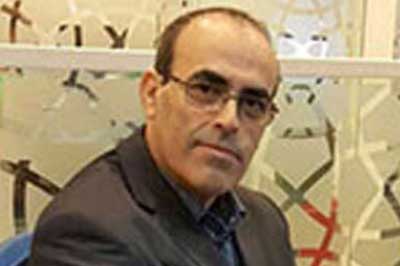A court in Algiers is due to issue its verdict on opposition political activist Karim Tabbou over charges apparently related to his political activity, which have been adapted to fit issues of national security and unity. The trial ended in the middle of last week, but the judge decided to postpone sentencing for seven days. No matter what the sentence is, though, it will condemn the government and no one else, because it is the government which is actually on trial, not Tabbou.
If he is found to be innocent, it will confirm the prevalent belief that the government fabricates allegations against its opponents, making it more authoritarian than it was during the rule of ousted President Abdelaziz Bouteflika (1999-2019). Tabbou’s acquittal will also mean that the government must prepare for new battles with him because it is inevitable that he will return to political activism with even more determination; he is not someone who gives in after facing the first test. However, a conviction and prison sentence will prolong the toxic atmosphere imposed by the regime, along with its consequent negative repercussions, because the man is a symbol of something important to many Algerians, and not just an individual.
OPINION: Elements of popular movement want to smash Interior Minister, demolish Algeria
Before Tabbou came along, the Algerian courts issued dozens of verdicts against male and female activists who emerged during the Hirak protests as potential leaders, and they will do so again after him. Most of these activists were thrown into prison during the interim rule of former army Chief of Staff Lieutenant-General Ahmed Gaid Salah last year, inspired by his hard-line speeches after he decided to take over the country after the first two months of the Hirak movement taking to the streets in February 2019. The activists were thrown into prison on ready-prepared false charges, such as violations of national unity, even though national unity was never better than it was with the Hirak.
![Algeria: Army leadership has no political ambitions - Cartoon [Sabaaneh/MiddleEastMonitor]](https://i0.wp.com/www.middleeastmonitor.com/wp-content/uploads/2019/10/IMG_1438.jpg?resize=920%2C650&ssl=1)
Algeria: Army leadership has no political ambitions – Cartoon [Sabaaneh/MiddleEastMonitor]
All of this was an effort to get rid of the toxic burden, even if it was costly to the government and carried with it the danger of some activists returning to the political arena. Overall, though, releasing them is cheaper than keeping them in prison, especially if the government has received pledges from some to stay away from the Hirak movement.
READ: Algerians say oil price crash shows need for reform
Nevertheless, the many arrests of activists in the popular and university movement are a clear sign that the government has not learned anything from Algeria’s many and disastrous mistakes. Prisons in Algeria, as elsewhere, are a political school within which a prisoner can prepare their road map for life after their release. Political prisoners are politicians in the making, and they realign their priorities, often with a more determined attitude. In Algeria’s prisons, the politically illiterate are politicised, and the neutrals wake up. There too we see that some are radicalised on the path towards terrorism. This is not something unique to Algeria. Terror attacks in London and Tunisia have been committed by people who were released from prison shortly before the attacks took place.
Informants and spies are also identified and shaped in prison. The journey to this shadowy existence begins when the government succeeds in tempting prisoners by playing on their weaknesses, frustrations and general turmoil.
The Algerian government recruited prisoners as informants, especially Islamists and terrorists in the 1990s, and employed them in its dirty war at the time. However, if the current government still believes that what worked 25 years ago or more will succeed today, it is certainly misguided and has learnt nothing from the lessons of history and politics. It is worrying that the government does not seem to know how much Algerian society has changed.
READ: Algeria leader warns against attempts to incite protesters to violence
This ongoing idiocy made Fadil Boumala, Tabbou and others “free” in their cells, and those who ordered their arrest were the real prisoners of that “freedom”. Those who decided that the height of popular anger was the right time to detain such men and women, and keep them in solitary confinement for months without trial, scored a massive own goal. In doing so, they only increased the determination and persistence of those they imprisoned, as well as the level of anger within the Hirak movement. It should have been sufficient for the government to see how the trial of Boumala and Tabbou resulted in the opposite of the desired result as it turned into a popular, political festival, within and outside the courtroom. This was a scandal that condemned the government and increased the popularity of those whom the government wants to remove from the political arena. How much more political idiocy is the people of Algeria expected to take?
This article first appeared in Arabic in Al-Quds Al-Arabi on 9 March 2020
The views expressed in this article belong to the author and do not necessarily reflect the editorial policy of Middle East Monitor.

![Algerians stage a demonstration demanding regime officials - who continue to work after former President Abdelaziz Bouteflika resigned -- to step down, in Algiers, Algeria on 4 October, 2019 [Mustafa Hassona/Anadolu Agency]](https://i0.wp.com/www.middleeastmonitor.com/wp-content/uploads/2019/10/20191004_2_38573611_48196421.jpg?fit=920%2C613&ssl=1)







